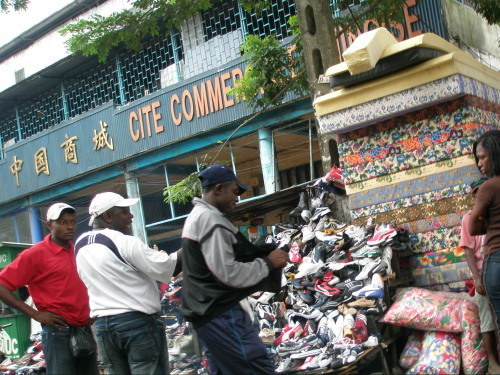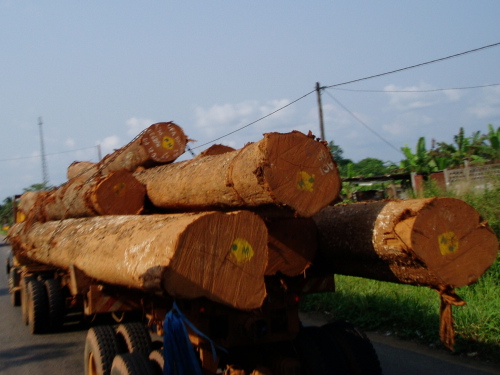30 Jan 2007
The Chinese president Hu Jintao began his eight-nation African tour in Cameroon Tuesday. Cameroon is his first stop in a journey over the next 12 days that will take him to such other African countries like Sudan, Liberia, Namibia, South Africa, Zambia, Mozambique and the Seychelles. As he has always done in previous trips, the Chinese leader is going to sign many trade agreements with his African counterparts. Most of the agreements will be connected to securing uninterrupted supply of African natural resources to China.
As her economy enjoys uninterrupted growth for more than a decade, China’s appetite for raw materials has become insatiable. The Chinese leadership recognizes the strategic importance of African resources in their economic equation. That is why they are doing everything to court the Africans. Currently, a third of China’s oil import comes from Africa. Hu Jintao is making his third visit to the continent and it comes on the heels of the recently organized Sino-African Summit that took almost all African heads of states to Beijing last November.

Chinese shop and Chinese-made shoes in Douala (photo: Njei M.T)
The Chinese will publicly tell you that they are expanding trade and extending foreign aid to Africa. Yes, trade with Africa last year exceeded $55 billion. Just like the trade with the Europeans that came before them, the African side of the trade involves exporting mostly ‘cheap’ but very valuable raw materials in exchange for manufactured consumer products. As for the aid, it can be generally said that the Chinese are aiding Africans They are involved in building infrastructure and extending soft loans to Africa. Whether that is aid, or an inducement, or a tip or even a bribe will depend on who analyses it. Africans have been receiving this stuff called ‘AID’ before but have never succeeded coming out of poverty or avoided falling into the debt trap. Some resource-rich nations amongst them actually graduated with an HIPC (highly indebted poor countries) certificate to show for their many years of receiving ‘aid’ from the West.
In the 1870s and 1880s the Europeans scrambled for Africa principally because of African resources. This led to the partition of Africa to the benefit of the Europeans without due regard to the interest of the Africans. Incompatible people were fused together under one country and some ethnic groups and even families were divided and their members found themselves on different sides of international borders. Today, some of the contradictions created by the colonialists are still resonating in different forms.
The Chinese are coming to Africa at the time that some of the legacies of Africa’s colonial past have manifested themselves in very dramatic ways. Typical examples are the Rwandan genocide and the crisis in Sudan. Just like the Europeans before them, the Chinese seem to give the impression that they do not particularly care about the interest of the Africans as they pursue their quest for resources on the continent. It was, to say the least shocking for Africans to see Mao’s China trying to block the sanctioning of Sudan at the United Nations for her role in the ongoing genocide in the Darfur. The behavior of China (a permanent member of the UN Security Council) places her (in the eyes of Africans) firmly on the side of the al-Bashir regime in Sudan that has been accused of crimes against humanity. This type of diplomacy is tarnishing the image of a China that Africans were expecting her to be the voice of the oppressed at the UN Security Council.
The demand for African resources can only skyrocket with the passage of each day. If you consider the sheer size of the combined population of China and India (both of whose economies are expanding rapidly) and their needs for resources to feed their industries, you will then easily appreciate the magnitude of the pressure.
The eyes of the West and the East are all focused on Africa and a new sophisticated and desperate scramble for Africa is already in progress. As it happened with the previous scramble, Africans are emerging as the losers.
The availability of resources in Africa has fanned most of the continent’s wars. Corruption, bad governance, insecurity and instability are other characteristics of a continent reeling under the effects of multiple influences and pressures. As different contending powers try to have an edge over each other, they do everything to ensure that their local allies gain political power usually by unfair methods. Those African rulers that eventually emerge usually work to satisfy their godfathers abroad to the detriment of African interests.
As Hu Jintao comes calling, ordinary Africans watch from the sidelines as they usually do when his rivals come from Western capitals. Like their parents before them, the Africans will listen to sugar coated speeches about an imminent bright future that will hardly materialize.
The only things they surely will see after his passage are more trucks and trains ferrying timber, diamonds, bauxite, copper etc to the seaports. They will feel the impact of more environmental degradation after his passage like they are used to feeling after the passage of his rivals from the West. Some of them will begin to understand why some of us say that natural resources are a curse to Africa.

Ferrying timber to the seaport (photo: Njei M.T)
Njei Moses Timah
|